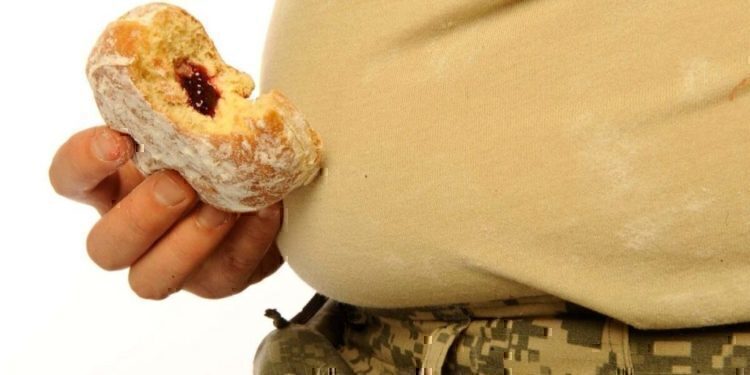From Militarytimes.com
A 2018 RAND report on health promotion and disease prevention has painted a grim picture of the military’s physical fitness and sleep standards.
The study, featuring roughly 18,000 randomly selected participants across each of the service branches, showed that almost 66 percent of service members are considered to be either overweight or obese, based on the military’s use of body mass index as a measuring standard.
While the number of overweight service members is a cause for concern, it correlates with the obesity epidemic plaguing the United States, where, as of 2015, one in three young adults are considered too fat to enlist, creating a difficult environment for recruiters to find suitable candidates for military service.
Broken down by service, the 2018 report lists the Army as the branch accounting for the highest percentage of overweight troops, with 69.4 percent of soldiers falling under this category.
The Army was followed by the Coast Guard (67.8 percent), Navy (64.6 percent), Air Force (63.1 percent) and Marine Corps (60.9 percent).
Another glaring area of concern highlighted in the study was the inability of service members to get adequate sleep.
Nearly 9 percent of military personnel reported taking sleeping medications either “daily” or “almost daily.”
/arc-anglerfish-arc2-prod-mco.s3.amazonaws.com/public/HFE5MZPLCFELDPMS6GUXEKWMN4.jpg)
The Army reported the highest rate of sleep concerns, with 10.6 percent of soldiers routinely consuming sleeping aides. Marines (9.9 percent), airmen (7.5 percent) and sailors (6 percent) rounded out the troubling category.
In terms of problematic sleeping patterns, 59.4 percent of soldiers reported getting less sleep than needed, and 33.2 percent answered that the lack of sleep contributed to being regularly bothered by an energy deficiency.
Personnel from the other services, especially the Navy and Marine Corps, reported experiencing the aforementioned sleep issues at a similar rate.
An extensive 2017 review of inpatient and outpatient records, dating from 2005 to 2014, for active-duty military personnel found that both insomnia and sleep apnea are on the rise, according the Journal of Sleep Research.
“Sleep disorders are a serious problem that interferes with the ability of soldiers to do their jobs effectively,” Harris Lieberman, study author and military nutrition specialist at the U.S. Army Research Institute of Environmental Medicine in Natick, Massachusetts, told Reuters.
Similar sleep concerns in the Navy’s surface fleet were heavily scrutinized this year in the wake of the service’s fatal collisions involving the destroyers Fitzgerald and John S. McCain.
In response to sailor reports of sleep deprivation due to the Navy’s furious operational tempo, top brass implemented a policy featuring overhauled watch schedules that better align with sailors’ circadian rhythms, a move designed to allow for improved rest periods.
The RAND report’s Health Related Behaviors Survey has been issued periodically for 30 years by the Department of Defense in an effort to best gauge the condition of the country’s fighting force.
Survey items traditionally examined include health promotion and disease prevention, substance use, mental and physical health, sexual behaviors and deployment experiences.
Read more at militarytimes.com




